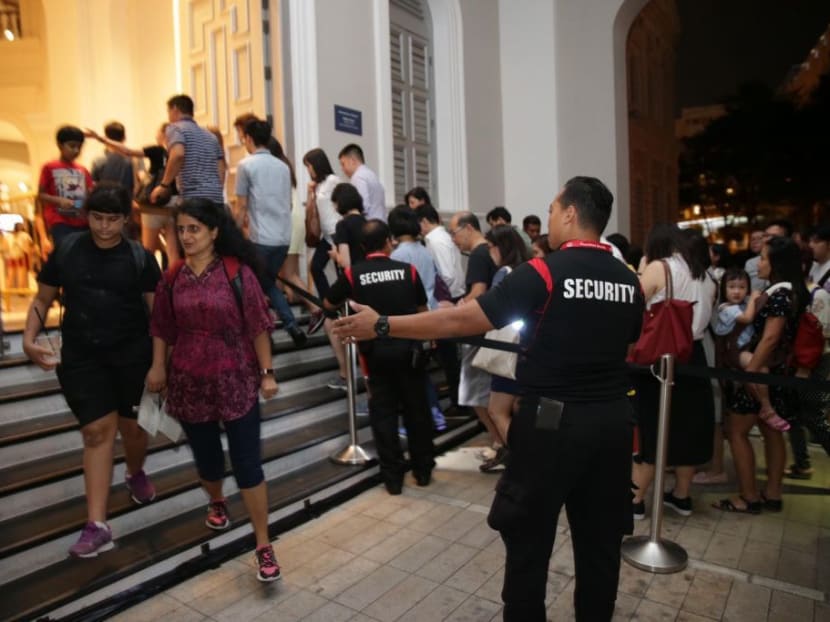Higher wages for security officers from 2019, fewer overtime hours allowed from 2021
SINGAPORE — Private security officers will be paid up to S$300 more over three years starting 2019, after the government accepted recommendations by the Security Tripartite Cluster on Thursday (Nov 23).
SINGAPORE — Private security officers will be paid up to S$300 more over three years starting 2019, after the government accepted recommendations by the Security Tripartite Cluster on Thursday (Nov 23).
From 2021, their overtime hours will be capped at 72 hours a month — in line with the Employment Act — instead of the current 95 hours under the average arrangement of 12-hour shifts six days a week. Thereafter, exemptions will be issued on a case-by-case basis only to meet short term needs, said the government.
The changes will affect about 34,000 security officers employed by more than 240 security agencies here.
The tripartite cluster recommended an increase of S$75 in 2019 to the basic minimum wage of security officers, and another S$75 in 2020, followed by S$150 in 2021.
This means a basic wage of at least S$1,400 for security officers under the Progressive Wage Model in 2021 – up from S$1,100 now.
For senior security officers and above, the increase will be S$285 over the three years. The current basic wage floor of S$1,300 for senior security officers will rise by S$60 in 2019 and 2020, followed by S$165 in 2021, to hit S$1,585.
The highest increments will take place in 2021 to coincide with the lower cap on overtime hours, so that most officers’ gross wages would not be adversely affected.
Security agencies are encouraged to alternate between five- and six-day work weeks for their officers.
From 2022 to 2024, the cluster recommended annual increments of at least 3 per cent per annum, subject to review, across all ranks.
The higher wages will cost security agencies — and, likely, their clients — 30 to 35 per cent more, said Mr Raj Joshua Thomas, president of the Security Association (Singapore).
But the changes are necessary, said the cluster, headed by National Trades Union Congress assistant secretary-general Zainal Sapari and which included security agencies.
“As the demand for security services continues to rise with the emergence of new buildings and infrastructure, and given the rising threat of terrorism, further measures are needed to uplift the security industry,” it said.
This will attract more and younger Singaporeans to join the sector, and ensure security officers have the skills and competencies to perform their roles well. From Jan 2020, security officers are required to be trained to recognise terrorist threats.
Security firms largely welcomed the changes.
Mr Thomas said it would improve the professionalism of the sector. “(This means) taking out all of the non-security job functions… and getting them to really focus on access control, patrolling and counter terrorism,” he said.
But some were concerned about the major increase in overhead costs by 2021.
“If given a choice, I think it would be better to spread out the increases over four years, to make it more manageable for (firms like) us,” said Ms Grace Lim, general manager of Reachfield Security and Safety Management.
Wondering if clients would be able to stomach the “big increase”, Ms Lim said: “What we can do is to see (if) areas we can deploy technology to complement areas where there are manpower needs.”
Reachfield has gradually implemented a visitor management system, which allows visitors to scan their IDs instead of having security officers manually jot down the details. The system has helped to reduce the number of officers required at each point.
Technology can help alleviate increases in manpower costs, said Mr Robert Wiener, President of the Association of Certified Security Agencies.
“I believe that we can use technology to complement manpower, and we should be giving officers the tools to provide better, value-added services like investigation, instead of having to perform roles like patrol around malls or condominiums,” said Mr Toby Koh, group managing director of Ademco Security Group.
Security officers, meanwhile, look forward to getting more rest. “The extra two days of rest (a month) will give me more time with my family,” said senior security officer Ahsotha Kunasingam, 53. “The one day of rest (a week) I had intially was not enough for me to do housework,” said the mother of one, who also has to care for her sick mother.
The Progressive Wage Model for security agencies became a licensing condition of the Police Licensing and Regulatory Department from September last year, after recommendations were first released in 2014.







